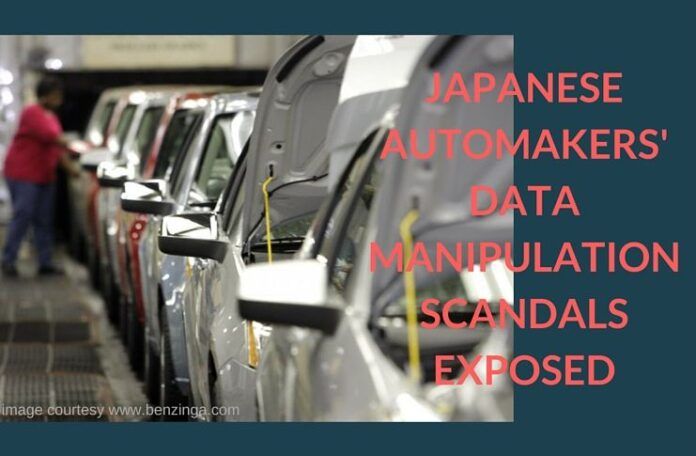
A string of data manipulation scandals exposed in recent months have costed Japanese automakers dearly, with damage going beyond the country as some foreign manufacturers as well.
General Motors was forced to recall millions of cars due to defective parts from Japan.
[dropcap color=”#008040″ boxed=”yes” boxed_radius=”8px” class=”” id=””]G[/dropcap]iven the fact that not one, but several Japanese enterprises are found to have engaged in such malpractice for years, industry observers and analysts say they could hardly attribute the massive data manipulation solely to an erosion of ethics among Japanese industry giants while ignoring the apparent lack of government’s supervision and the problems in Japanese corporate culture.
SUPERVISION LOOPHOLES
[dropcap color=”#008040″ boxed=”yes” boxed_radius=”8px” class=”” id=””]A[/dropcap] third-party independent investigation has recently revealed that Japanese automobile supplier Takata manipulated and falsified test data regarding its air bags.
Having caused over 100 deaths during the last decade, the defective air bags produced by Takata has led to a worldwide automobile recall from markets in North America, Europe, China and Japan.
On May 18, 2016, Suzuki, the second largest Japanese manufacturer of light vehicles, admitted that it had falsified the fuel-economy data regarding 16 types of vehicles sold in Japan, involving over 2.1 million vehicles.
On April 20, 2016, Mitsubishi Motors’ President Tetsuro Aikawa admitted in a press conference that his company had manipulated the fuel-economy tests, which involved some 600,000 vehicles.
Many industry insiders have pointed out loopholes in Japan’s auto fuel-economy test system.
[dropcap color=”#008040″ boxed=”yes” boxed_radius=”8px” class=”” id=””]I[/dropcap]n Japan, before an automaker launches a new model, the National Agency for Automobile and Land Transport Technology, an organization affiliated to the Ministry of Land, Infrastructure,Transportation and Tourism (MLIT), will check the safety and environment parameters of the vehicle, and the multi-item check list include fuel efficiency.
The problem is, however, the basic data used to calculate fuel efficiency are provided by the same enterprise that produces the vehicle.
Following the disclosure of the Mitsubishi scandal, the MLIT investigated the case and found that the agency responsible for pre-market inspection had simply copied seven set of figures provided by the enterprise without any verification.
Meanwhile, the shocking length of data falsification, which lasted over decades, also has its roots in a customary practice among Japanese automakers: They use very strict standards in choosing suppliers but once a company has entered their suppliers’ list, these auto giants tend to use less-rigid standards in evaluation, and some even does not conduct any reassessment at all.
FAULTY CORPORATE CULTURE
[dropcap color=”#008040″ boxed=”yes” boxed_radius=”8px” class=”” id=””]T[/dropcap]he underlying defects of Japan’s corporate culture also make it difficult to spot malpractices such as fudged data, and if the improper conducts are discovered, it will still take years to correct the wrongdoing.
Yasushi Ando, chair of Japan’s New Horizon Capital, said that the belated disclosure of the automakers’ data manipulation has something to do with the “vertical corporate structure.”
People stay in the same department for decades and it’s difficult for an outsider to know what is happening there, Ando explained.
Meanwhile, whistleblowers who expose a defective product or improper corporate practice are seen as a common enemy by his or her co-workers. They are often disdained and fired by the company. So many simply choose to ignore what they see, or are forced to help cover up the scandals.
All in all, the recent scandals surrounding Japan’s automakers are not isolated incidents, but a result of interweaving factors involving both the government and businesses, and similar cases will keep happening unless there’s radical change in the government’s supervisory role and in the corporate culture as well.
Notes: Xinhua-(This story has not been edited by PGurus.com and is generated from a syndicated feed we subscribe to)
- Pentagon cancels aid to Pakistan over record on militants - September 2, 2018
- The curious case of Tamil Nadu’s opposition to NEET - September 4, 2017
- If 2.6 Billion People Go To War: India vs. China - July 22, 2017










